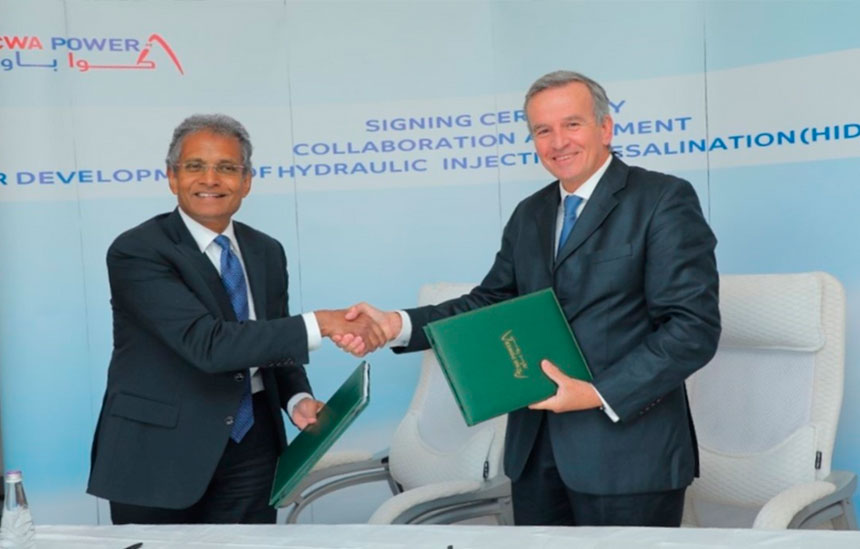- Hydraulic Injection Desalination (HID) technology in plants uses one third less energy top-of-the-line seawater reverse osmosis desalination plants, and ten times less than traditional thermal desalination facilities
ACWA Power, a leading Saudi developer, investor, and operator of power generation, water desalination and green hydrogen plants worldwide, signed an industrial development agreement with Water Global Access, a research and technology development firm, to integrate Hydraulic Injection Desalination (HID) technology at scale. The agreement was signed on the side lines of the Future of Desalination International Conference in Riyadh, Saudi Arabia.
The agreement comes six months after both companies signed a collaboration agreement to develop a roadmap for HID across ACWA Power’s projects. The latest agreement will involve the implementation of a pilot project that includes HID in the Gulf Cooperation Council (GCC) region, following research that has demonstrated that the technology has the potential to break the 2.0 kilowatt per hour (kWhr) barrier of energy consumption to produce one cubic metre of water from seawater.
Energy consumption in desalination plants is also referred to as the total specific energy consumption. HID’s results indicate a step change against the most energy-efficient commercial seawater reverse osmosis (SWRO) desalination facilities, which consumes approximately 3 kWh/m3 and more than 10% improvement compared to the current Guinness book record for an SWRO pilot plant of 2.271 kWh to produce a cubic meter of water.
With continued industrialisation and demographic growth, water consumption across the world continues to rise at a rapid rate requiring urgent solutions. The potential emanating from water production utilising cost effective, low carbon-intensive technologies is truly exponential and we are proud to pilot the ground-breaking HID technology, which is going to be a giant step forward in revolutionising the desalination industry. Paddy Padmanathan, Chief Executive Officer and Vice Chairman of ACWA Power
Total specific energy consumption is a metric that has a direct impact on the operating costs of a desalination facility. For private companies that operate in the same industry, desalinated water is sold to governments on long-term contracts over a fixed tariff. In ACWA Power’s case, the company has found a direct relationship between reduction in tariffs, and reduction in energy consumption. This means that a reduction in energy used to produce water will result in lower tariffs for government tender purposes.
“With its low energy footprint, HID technology has the potential to lower operational costs for our desalination business, which we hope will lead to lower tariffs in the long term. For governments, this means that it is more affordable to produce water. For investors, this could mean higher profits per facility. And for communities, it means that they are getting usable water with the least impact on the environment.” he added
A demonstration project is expected to be completed by 2023. If the project demonstrates the same outcomes in using less than 2kwhr/m3, then ACWA Power will have the lowest rate of specific energy consumption in producing desalinated water from seawater in the GCC region.
Technical readiness tests confirm that the capacity of HID to break the 2kWh/m3 seawater desalination threshold, opening a new paradigm in the industry’s efficiency levels. WGA’s industrial development roadmap objective aims to complete advanced technical readiness levels by the end of 2023 and commercialise HID by 2024. We also welcome ACWA Power’s commitment in this technology, which further cements their position as a global leader in high impact water innovation. Eusebi Nomen, Chief Executive Officer of WGA

